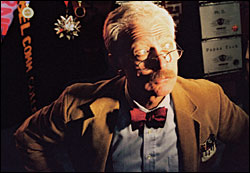THE GAS MAN
Empty Space Theatre, 3509 Fremont Ave. N., 206-860-7163. $10. 11 p.m. Fri.-Sat. Ends Sat., July 19
Sometimes people perform plays for their own amusement. I’m fine with thatI only ask that I be amused, too. I don’t ask for a 45-minute production that looks and feels like an extended inside joke. In the case of The Gas Man, the audience tittered from time to time, usually in isolated groups (friends of the cast, I’m assuming). But the rest of us sat in relative silence while actors warbled tunes in this cheerfully pointless, mercifully short play.
The Gas Man is a world- premiere rock opera by Herbert Bergel (Voyage of the Beagle). I won’t get into the various story lines here (frankly, I’m not sure I understood all that happened, since most of the singing was unintelligible), but the basic plot involves a married couple waiting anxiously for the title character to arrive. When the Gas Man finally appears, it’s a fine, funny moment, just like several other fine, funny moments that precede it. But most of the time, I was distracted by an insistently slapdash production that features a whole lotta actors who might’ve rehearsed just a few weeks more. Spontaneity can be pretty charming; arty obliqueness can be charming, too. Smug ineptitude, on the other hand, is always a drag. CHRIS JENSEN
 IPHIGENIA
IPHIGENIA
Theatre 4, Seattle Center House, 206-335-5132. $8. 8 p.m. Fri.-Sat. Ends Sat., July 5
Iphigenia, daughter of Agamemnon, was sacrificed to the goddess Artemis because the sea was too calm. Her myth is a relic, even by Greek standardsa messy remnant of the old child-sacrifice rituals that predated Homer. And that’s exactly why Euripides wrote two plays about her (Iphigenia at Aulis and Iphigenia in Tauris, here combined into a single tragedy), which tell the story of a goddess who demands the unspeakable. Euripides liked the subject, I’m guessing, because he never warmed up to the gods. He always prodded them, questioned them, andwhen he couldn’t think of anything elsehe’d simply use them to get his characters out of a bad scrape. For him, the gods were glorified meddlers: divine beings who, in Iphigenia’s phrase, “may or may not be wise.”
The play isn’t a frolic. It’s a harrowing ordealyou can cut the pity and fear with a knifeand the new production from Poet’s Theater is good enough to make you heartsick. Director M.J. Sieber, assisted by a mostly excellent cast, stages an uninterrupted series of chilling scenes; the result is a show full of unmixed urgencythe kind of urgency you don’t usually find outside an intense private reading. Add to that Sieber’s sleek set design (complemented by his costumes, which appear to be right out of Kenneth Cole), and you’ve got a Greek drama that feels more modern and relevant than anything I’ve seen in weeks. C.J.
LUDIKER
Leo Kreielsheimer Theatre in the Seattle Rep, Seattle Center, 206-325-6500. $15-$20. 7:30 p.m. Wed.-Sun. Ends Sun., July 13
I’m sure this will enrage serious artists everywhere, but you can usually judge a night of theater by the text in its program. Let’s be honest: You turn to a bio and read, “Comic actor and writer Fred O. Knipe is best known as the pre-eminent humorist for lawyers,” and your heart plummets several stories and is stepped on by some happy bastard on his way to the movies. Ludiker‘s Mr. Knipe seems a good sort to me, and I have no reason to doubt he’s busting the guts of everybody at the Steinberg, Williams & Klein Christmas party, but his show was 90 minutes I could’ve spent somewhere else.
Knipe is the titular hero of this solo piece, which is sort of a very poor man’s Underneath the Lintel, the woundedly beautiful Glen Berger play (staged earlier this season by the Empty Space) in which an obsessive librarian unwittingly reveals his soul to us in the course of an evening’s lecture. Knipe’s Ludiker is some nutty know-it-all presenting “Your Evening With Greatness,” in which he shares his ersatz wisdom and tries to avoid his distress over the estrangement of his wife and children.
Writer Knipe does have a disarming, off-center way with his character’s philosophy, including the notion that humans have been drifting apart because we’re the only species to have stopped licking our offspring. Actor Knipe, however, needs a little guidance, and, unfortunately, he’s only got director Knipe to fall back on. The show devolves into embarrassing whimsy: It ends with an epiphanic Ah!-How-foolish-I’ve-been! jig meant to indicate how little any of us ever really know about anything. Argh. The show is no better or worse than an irreverent toastmaster’s speech about stopping to smell the roses. STEVE WIECKING




